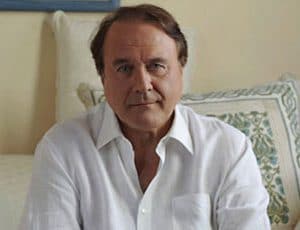
Focusing on trends and issues which the world will be facing by 2025


Futurist and researcher with a close interest in key trends and strategic challenges facing current and future business
Request fees and availabilitySend a simple request. You’ll get a quick reply with fees and availability
About James
Keynote
Articles
James can be described as ‘a historian of the future’. He has a close interest in key trends and strategic challenges facing current and future business up to Horizon 2020 and beyond. He is an obvious choice as a keynote speaker and moderator at high level conferences and events all around the globe. He has published a number of books and special reports on the world of tomorrow.
James became the first British staff member of the US-headquartered futurology ‘think tank’ the Hudson Institute, taking a senior role at the Institute’s European division based in Paris. He has more than twenty-five years experience as an award-winning TV broadcaster, presenting The Money Programme for BBC TV for three years before moving to Newsnight and Panorama and then to ITV. He has also served as Editor and studio presenter at Financial Times Television and Sky News for seven years, heading up their financial and business coverage.
James received his Masters in law and history from Cambridge and went on to receive a PhD from the London School of Economics. In 2007 he was elected Fellow of the World Innovation Foundation, founded by Nobel Laureate Glenn Theodore Seaborg. He is also a Member of the British Academy of Film and Television Arts and a Director of The Talent Foundation.
As a futurist James focuses on issues and topics such as: scenarios for the next 5-10 years, the emerging new balance of world economic power, the impact on business strategy of new technologies and the wireless, connected world. He also explores Digital Behaviour; new business ‘eco-systems’ — the shape, style and psychological characteristics of tomorrow’s company, as well as work and the workplace in the future digital world. As you can tell, James’ topics span so many areas including Industry 4.0, retail, manufacturing, the future of health care and energy, as well as the future disruptive economy and technology.
With his strong broadcasting background James also frequently acts as moderator at major conferences and awards ceremonies around the world. He is an incredibly talented and well-liked host. Recent moderating engagements include the British-American Business Council Forum in San Francisco, The New Energy Economy in London, The World Trade Summit in Hamburg, and the Technoport Climate Change Summit 2012 in Trondheim, Norway.
See keynotes with James BelliniHis clients include UK government departments and the EU Commission, the British-American Business Council, international professional associations and leading blue chip companies such as IBM, HSBC, Microsoft, Bull, BP, Accenture, Motorola, GE, Barclays Bank, PepsiCo, Gucci, British Telecom, Canon, Symbian, Skillsoft, Pfizer, Nokia, nPower, Orange, PwC, HP and Blackberry.
What is the most amazing experience you have had as a speaker?
As a speaker and conference moderator I travel all over the world so my experiences are around people and places. I met and interviewed Nelson Mandela while working at the Davos World Economic Forum – he was a totally inspiring figure. In terms of place – my work has taken me to many fascinating places, but I think Langkawi was the most fascinating – it is a group of 104 islands off the north west coast of Malaysia. It’s fabulous geography made it a setting for one of the James Bond movies – my visit was a little less exciting, working with a major bank, but it was a very special place nevertheless.
Can you briefly define the Digital Consumer?
It’s no secret we now live in the digital age, but digital technology is transforming the way people make consumer decisions and also how business now uses that technology to analyse consumer behaviour and expectations and manage their customer relationships in a totally new, customer-centric way. Together these two trends are creating the digital consumer.
What are some of the major trends you foresee within the next ten to twenty years?
A shift in working practices towards a ‘free agent’ landscape in which people will increasingly work where and when they want.
In the post-industrial old developed world, a return to the making of things – a kind of second industrial revolution based around advanced technologies and life sciences. With ageing populations and the rise of a ‘live-alone’ society (today in Europe the fastest growing household unit is the single-person household) there will be a trend towards re-inventing the idea of ‘community’ and a different kind of urban life.
One of the great challenges in this century is creating a more sustainable – and frankly more intelligent – approach to producing, processing and distributing food. One way to achieve this is to re-discover the traditional idea of eating what the seasons provide, another is growing more of our food in cities rather than on large-scale rural farms.
How do you work with clients when preparing for a keynote?
I never give the same presentation twice and always make my talks as relevant as possible to the professional challenges and interests of the audience in front of me. So thorough briefing discussions with the client are an essential ingredient – I always tell a client when preparing for an event ”I prefer more rather than less… send me anything and everything you think will help me do the best job”.
What are some of your most popular keynote topics?
Send a simple request. You’ll get a quick reply with fees and availability